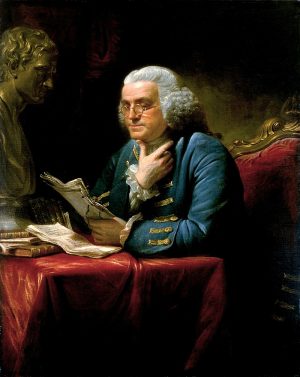Benjamin Franklin (1706-1790) was born into a family of devout Puritans and was raised in the Protestant tradition. He was baptized in the Old South Church of Boston. However, throughout his life, he increasingly distanced himself from Christianity and developed a more rationalistic and deistic perspective. In his later years, he became interested in alternative religious philosophies, such as those of Confucianism and Taoism.
Deism and Providence
In his autobiography, he classified himself as a deist. Deism is a belief in God based on reason and observation rather than revelation or faith. Deists believe in a supreme being who created the universe and then stepped back, allowing it to run according to natural laws. Most deists reject the idea of a personal God who intervenes in human affairs. They abide by natural theology (or physico-theology), which is the belief that one can gain knowledge of God through observing and experiencing nature.
He published “Articles of Belief and Acts of Religion” in November 1728 to present his views on religion. In it, he professed a belief in one God who created the universe and endowed humans with reason so that they could discover his laws. However, he did not mention much religious dogma. As to the belief in Jesus Christ’s divinity, he wrote this in a letter to Ezra Stiles in 1790:
“As to Jesus of Nazareth, my opinion of whom you particularly desire, I think his system of morals and his religion, as he left them to us, the best the world ever saw or is like to see; but I apprehend it has received various corrupting changes, and I have, with most of the present Dissenters in England, some doubts as to his Divinity; though it is a question I do not dogmatize upon, having never studied it, and think it needless to busy myself with it now, when I expect soon an opportunity of knowing the truth with less trouble.”
In the articles he published, he also remarked that he did not like attending Sunday church services, as he found the sermons lacking in substance. He did not see any moral content in them. Therefore he did not see any use in attending church at all. It was just a waste of time. In fact, he thought lighthouses were more helpful than churches. He used his Sundays for his own studies instead.
Franklin still held Christian beliefs and even introduced a daily prayer during the June 1787 Constitutional Convention. He requested that one or more of the clergy would officiate the daily prayer service every morning before convention sessions began. He proclaimed:
“I have lived, Sir, a long time and the longer I live, the more convincing proofs I see of this truth—that God governs in the affairs of men… I firmly believe this; and I also believe that without his concurring aid we shall succeed in this political building no better than the Builders of Babel…” In this speech, he talked about Providence, or the idea that God oversees and directs the universe.
Religious Tolerance
Franklin was a supporter of religious toleration and believed that different religions could coexist peacefully. According to him, tolerance of different religious beliefs was the key to social harmony and each person should be free to practice their own religion without interference from the state. His advocacy for religious tolerance and freedom of conscience led to the development of religious pluralism in America.
When he was in London, Franklin became friends with Theophilus Lindsey. Lindsey was part of the General Assembly of Unitarian and Free Christian Churches (or British Unitarians) and he founded the Essex Street Chapel, the first avowedly Unitarian congregation in England. Franklin attended the inauguration of the chapel.
During the later years of his life, he developed a close friendship with George Whitefield, an Anglican cleric. He was a well-known Evangelical revivalist and was one of the founders of Methodism, a Protestant denomination. The two men shared a mutual respect for each other’s religious beliefs and views on social reform. Franklin was a strong supporter of Whitefield and he, along with Whitefield’s other supporters, built a large hall in Philadelphia that had a pulpit in which a preacher from any belief was allowed to speak.
In 1755, he wrote “A Parable Against Persecution,” an apocryphal 51st chapter of Genesis in which God instructs Abraham on the duty of tolerance. One of his most famous quotes on religious tolerance is this: “I think vital religion has always suffered when orthodoxy is more regarded than virtue.” He emphasized that on the last day, everyone will be judged according to their deeds, not their beliefs.
